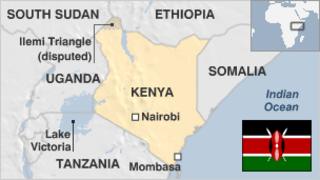Kenya country profile
Situated on the equator on Africa’s east coast, Kenya has been described as “the cradle of humanity”.
In the Great Rift Valley palaeontologists have discovered some of the earliest evidence of man’s ancestors.
In the present day, Kenya’s ethnic diversity has produced a vibrant culture but is also a source of conflict.
The Islamist militant Al-Shabab movement, active in Somalia, has also been launching a growing number of attacks in Kenya, including the 2013 Westgate shopping mall in Nairobi and the 2015 attack on Garissa University College in northwest Kenya.
Other pressing challenges include high unemployment, crime and poverty. Droughts frequently put millions of people at risk.
FACTS
The Republic of Kenya
Capital: Nairobi
Population 48.5 million
Area 582,646 sq km (224,961 sq miles)
Major languages Swahili, English
Major religion Christianity
Life extpectancy 63 years (men), 69 years (women)
Currency Kenya shilling
LEADER
President: Uhuru Kenyatta
The son of Kenya’s founding president, Uhuru Kenyatta took up his father’s mantle to become head of state in April 2013, despite facing charges of crimes against humanity over election violence five years earlier.
Mr Kenyatta, ranked by Forbes as the richest man in Kenya, was born in 1961 shortly after the release of his father Jomo Kenyatta from nearly 10 years’ imprisonment by British colonial forces, and two years before Kenya’s independence.
Educated in the United States at the elite Amherst College, where he studied political science and economics, he is viewed as the top political leader of Kenya’s largest tribe, the Kikuyu, who make up some 17% of the population.
However, he also appeals to Kenyans from different ethnic backgrounds, able to mingle not only with the elite he was born into but also with the average Kenyan, cracking jokes using local street slang.
He was declared winner of the presidential election in August 2017, but the Supreme Court declared the election null and void because of irregularities. He was also declared winner of the October re-run, which was boycotted by the opposition.
MEDIA
A handful of major commercial companies dominates the media industry, operating alongside state-owned Kenya Broadcasting Corporation (KBC).
TV is the main news source in urban areas. Internet use is high by regional standards, driven by the use of mobile devices.
The competitive press scene is the most sophisticated in the region. Newspapers are free to criticise politicians and the government.
Read full media profile
TIMELINE
Some key dates in Kenya’s history:
c 3.3 million BC – Evidence of some of the earliest human tools have been found in Kenya, suggesting that it was the cradle of humanity from which descendants moved out to populate the world.
1895 – Formation of British East African Protectorate, which becomes crown colony of Kenya – administered by a British governor – in 1920.
1944 – Kenyan African Union (KAU) formed to campaign for African independence. First African appointment to legislative council.
1963 – Kenya gains independence. Opposition groups are stifled and the country survives ethnic tensions and a coup attempt. Multiparty elections are allowed in 1991.
1998 – Al-Qaeda operatives bomb the US embassy in Nairobi, killing 224 people and injuring thousands.
2007 – Disputed general elections are followed by deadly violence.
2009 – Kenya says that at least 10 million people, or one third of the population, are in need of food aid. The government mobilises the military to distribute food, water and medicines to areas hit hardest by drought.
2011 – Kenya intervenes in conflict in Somalia and subsequently suffers several apparent reprisal attacks, including the 2013 massacre at Westgate shopping mall in Nairobi and the 2015 attack on Garissa University College in the northwest.
Source: Read Full Article



